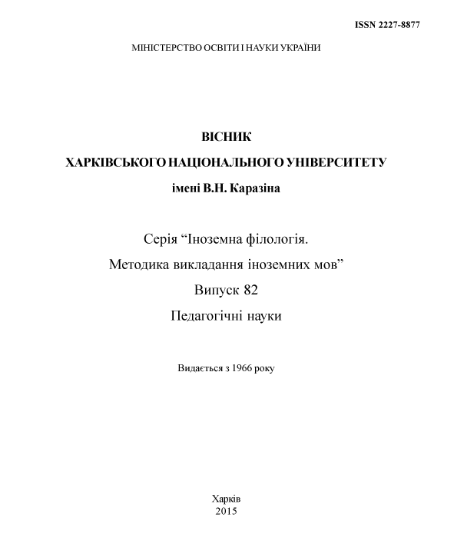Three basic principles of designing programs of teaching English to adults who learn it outside university language programs
Keywords:
commercial language courses, outside-university learning, principles of teaching/learning, teaching English to adults
Abstract
The paper discusses the founding principles for teaching English to adults in outside-university language courses. The principles include: developing courses on the basis of learners’ needs; taking into account their attitudes to teaching methods; and every course’s autonomy, structural, informational, organizational, and objective completeness combined with the structural, informational, organizational, and objective ties uniting all the courses. The suggested principles regulate the organization of teaching/learning, formulating its goals, selecting contents, and choosing its methods.
Downloads
Download data is not yet available.
References
1. Загальноєвропейські Рекомендації змовної освіти: вивчення, викладання, оцінювання / Наук. ред. укр. видання С.Ю. Ніколаєва. — К. : Ленвіт, 2003. — 273 c.
2. Green J. M. Student attitudes toward communicative and non-communicative activities: Do enjoyment and effectiveness go together? / J.M. Green. — The Modern Language Journal. – 1993. – 77. – P 1–10.
3. Hutchinson T. English for Specific Purposes: A learner-centred approach / T. Hutchinson, A. Waters. — Cambridge : Cambridge University Press, 1987. – 183 p.
4. Nunan D. The learner centred curriculum. A study in the second language learning/ D. Nunan. — Cambridge : Cambridge University Press, 1988. – 196 p.
5. Tarnopolsky O.B. EFL teaching in the Ukraine: State-regulated or commercial? / O.B. Tarnopolsky // TESOL Quarterly. — 1996. – V. 30. – P 616–622.
6. Tarnopolsky O. Teaching English intensively in a non-English speaking country. Theory, practice, and results / O. Tarnopolsky. – ERIC Document Reproduction Service No. ED 428 579, 1999. – 167 p. 7. Tarnopolsky O. Writing English as a foreign language: A report from Ukraine / O. Tarnopolsky // Journal of Second Language Writing. – 2000. – Vol. 9, No. 3. – P. 209–226.
REFERENCES
Nikolayeva, S.Yu. (Nauk. red. ukrayin. vydannya). (2003). Zahal'noyevropeys ki Rekomendatsiyi z movnoyi osvity: vyvchennya, vykladannya, otsinyuwannya /Common European Framework of reference for languages: Learning, teaching and assessments. Kyiv. Lenvit.
Green J.M. (1993). Student attitudes toward communicative and non-communicative activities: Do enjoyment and effectiveness go together? The Modern Language Journal, 77, 1-10.
Hutchinson, T. & Waters, A. (1987). English for Specific Purposes: A learner-centred approach. Cambridge: Cambridge University Press.
Nunan, D. (1988). The learner centred curriculum. A study in the second language learning. Cambridge: Cambridge University Press.
Tarnopolsky, O.B. (1996). EFL teaching in the Ukraine: State-regulated or commercial? TESOL Quarterly, Vol. 30, 616-622.
Tarnopolsky, O. (1999). Teaching English intensively in a non-English speaking country. Theory, practice, and results. ERIC Document Reproduction Service No. ED 428 579.
Tarnopolsky, O. (2000). Writing English as a foreign language: A report from Ukraine. Journal of Second Language Writing, Vol. 9, No. 3, 209-226.
2. Green J. M. Student attitudes toward communicative and non-communicative activities: Do enjoyment and effectiveness go together? / J.M. Green. — The Modern Language Journal. – 1993. – 77. – P 1–10.
3. Hutchinson T. English for Specific Purposes: A learner-centred approach / T. Hutchinson, A. Waters. — Cambridge : Cambridge University Press, 1987. – 183 p.
4. Nunan D. The learner centred curriculum. A study in the second language learning/ D. Nunan. — Cambridge : Cambridge University Press, 1988. – 196 p.
5. Tarnopolsky O.B. EFL teaching in the Ukraine: State-regulated or commercial? / O.B. Tarnopolsky // TESOL Quarterly. — 1996. – V. 30. – P 616–622.
6. Tarnopolsky O. Teaching English intensively in a non-English speaking country. Theory, practice, and results / O. Tarnopolsky. – ERIC Document Reproduction Service No. ED 428 579, 1999. – 167 p. 7. Tarnopolsky O. Writing English as a foreign language: A report from Ukraine / O. Tarnopolsky // Journal of Second Language Writing. – 2000. – Vol. 9, No. 3. – P. 209–226.
REFERENCES
Nikolayeva, S.Yu. (Nauk. red. ukrayin. vydannya). (2003). Zahal'noyevropeys ki Rekomendatsiyi z movnoyi osvity: vyvchennya, vykladannya, otsinyuwannya /Common European Framework of reference for languages: Learning, teaching and assessments. Kyiv. Lenvit.
Green J.M. (1993). Student attitudes toward communicative and non-communicative activities: Do enjoyment and effectiveness go together? The Modern Language Journal, 77, 1-10.
Hutchinson, T. & Waters, A. (1987). English for Specific Purposes: A learner-centred approach. Cambridge: Cambridge University Press.
Nunan, D. (1988). The learner centred curriculum. A study in the second language learning. Cambridge: Cambridge University Press.
Tarnopolsky, O.B. (1996). EFL teaching in the Ukraine: State-regulated or commercial? TESOL Quarterly, Vol. 30, 616-622.
Tarnopolsky, O. (1999). Teaching English intensively in a non-English speaking country. Theory, practice, and results. ERIC Document Reproduction Service No. ED 428 579.
Tarnopolsky, O. (2000). Writing English as a foreign language: A report from Ukraine. Journal of Second Language Writing, Vol. 9, No. 3, 209-226.
Published
2016-03-09
How to Cite
Тарнопольський, О. Б. (2016). Three basic principles of designing programs of teaching English to adults who learn it outside university language programs. The Journal of V.N. Karazin Kharkiv National University. Series: Foreign Philology. Methods of Foreign Language Teaching, (82), 15-20. Retrieved from https://periodicals.karazin.ua/foreignphilology/article/view/5393




